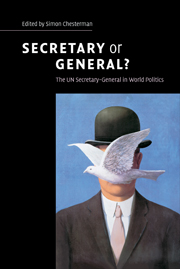Book contents
- Frontmatter
- Contents
- Contributors
- Foreword
- Acknowledgements
- Introduction: secretary or general?
- PART I Defining and refining the job description
- PART II Maintaining peace and security
- 4 Relations with the Security Council
- 5 Good offices and “groups of friends”
- 6 The bully pulpit
- PART III Normative and political dilemmas
- PART IV Independence and the future
- APPENDIX: selected documents on the Secretary-General
- Select bibliography
- Index
5 - Good offices and “groups of friends”
Published online by Cambridge University Press: 06 January 2010
- Frontmatter
- Contents
- Contributors
- Foreword
- Acknowledgements
- Introduction: secretary or general?
- PART I Defining and refining the job description
- PART II Maintaining peace and security
- 4 Relations with the Security Council
- 5 Good offices and “groups of friends”
- 6 The bully pulpit
- PART III Normative and political dilemmas
- PART IV Independence and the future
- APPENDIX: selected documents on the Secretary-General
- Select bibliography
- Index
Summary
The peacemaking function of the Secretary-General is conducted both in fulfilment of mandates entrusted to him by the Security Council – the “unstable and uneasy” relationship analysed by James Cockayne and David M. Malone in chapter 4 of this volume – and action outside such mandates, in the somewhat nebulous territory of “good offices”. This chapter explores an important means by which the Secretary-General may enhance his or her ability to influence the resolution of conflicts: the creation of informal and issue-specific small coalitions of states known as “groups of friends”.
The interaction with groups of friends highlights, as do other chapters in this volume, the tension between the fragile independence of the Secretary-General and the interests of the UN member states. Success has come when the Secretary-General has been able to engage the support, political leverage, and resources of friends behind a sustained peace effort. But it is not guaranteed. As an auxiliary device, a group of friends will not be able to overcome underlying conditions adverse to the resolution of a conflict; and in situations in which the interests of the states involved prioritize other issues – such as their own influence in a conflict environment or the bottom line of one or other of the conflict parties – over a settlement, their involvement may complicate rather than facilitate the Secretary-General's diplomacy.
Good offices, means, and resources
The concept of good offices is not itself mentioned in the UN Charter. It is, perhaps, implied within Article 33(1), which lists “other peaceful means of their own choice” among measures available to states to achieve the peaceful settlement of disputes, especially if read in conjunction with Article 99, which gives the Secretary-General a measure of discretion in areas of peace and security.
- Type
- Chapter
- Information
- Secretary or General?The UN Secretary-General in World Politics, pp. 86 - 101Publisher: Cambridge University PressPrint publication year: 2007
- 1
- Cited by



